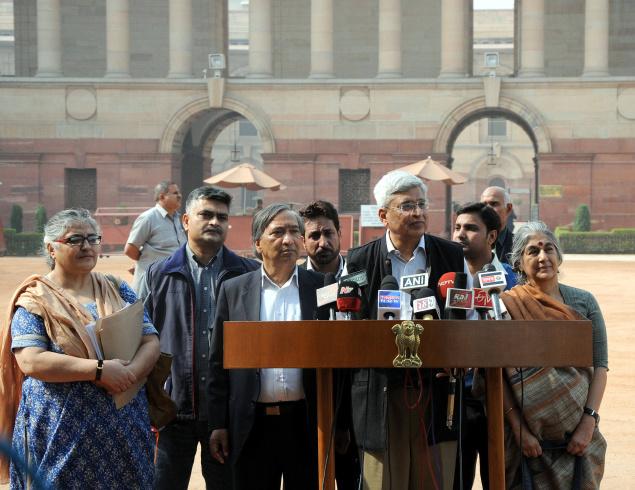
New Delhi, November 20: The Communist Party of India (Marxist) met President Pranab Mukherjee on Saturday to protest against the alleged targeting of Muslim youths in terror cases and demanded that innocent youths harassed by the police and investigative agencies be compensated.
CPI(M) General Secretary Prakash Karat led a delegation of terror victims to the President and submitted a memorandum, which details cases where youths slapped with terror charges were found to be innocent and acquitted after spending several years in prison.
"Today, we met honorable President of India to draw his attention towards the issue of targeting Muslim youths in the name of war on terror. He has assured appropriate action in this regard," Karat told reporters.
"While no quarter can be given to any individual or group responsible for terror attacks, the arrest of innocent Muslim youths has reached serious dimensions and requires immediate attention. Muslim youths are the most vulnerable targets today," he said.
He termed the fabrication of cases against Muslims youths as "dark spot on the secular democracy" of the country and said that the Government should adopt a policy wherein the victims of fabrication of terror charges by the police could get the compensation.
"It's a blot on the principles of secular democracy. At the same time, the arrest of innocent people means that the culprits go free," he added.
Presenting the cases of the four young men Md Aamir from Delhi, Syed Maqbool from Srinagar, Wasif Haider and Mumtaz Ahmed from Uttar Pradesh, the CPI(M) general secretary said, "The four youths were arrested arbitrarily when they were just 18 or 19 years of age, implicated in dozens of cases, incarcerated for over 10 years and each one of them was, as held by the courts, innocent. They are today without jobs, considered unemployable, with dark and uncertain futures."
"Young lives have been destroyed, families stricken, forced into social isolation, driven into debt to pay the huge expenditures in legal fees—the terrible conditions caused by State led injustice," Karat added.
The CPI(M) demanded compensation and rehabilitation for those implicated in cases, action against those who framed innocents and the scrapping of draconian provisions in the Unlawful Activities (Prevention) Act.
Demanding that the Unlawful Activities (Prevention) Act be repealed, Karat said, "Draconian provisions of the UAPA are being used to deny the normal process of justice, while there is no time bound procedure for the judicial process. There is a growing feeling of fear and apprehension on the one hand and anger on the other that innocents are being implicated."
According to Md Amir Khan, the President also agreed for the need of policy to compensate and rehabilitate victims of fabricated charges. He assured that he would speak to concerned departments and state governments in this regard, Amir told Daily Bhaskar.
The delegation included CPI(M) leader Subhashini Ali, the party's Jammu and Kashmir legislator Mohd Yusuf Tarigami, two youths who had spent 14 years in jail before being acquitted and another who had served eight years in a Kanpur prison.






Comments
Add new comment